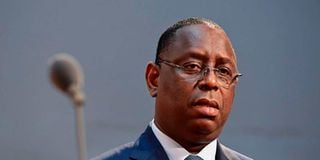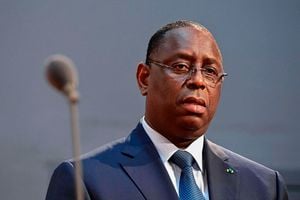
A boy runs past barricades as Senegalese demonstrators clash with riot police during a protest against the postponement of the February 25 presidential election, in Dakar, Senegal February 4, 2024. (inset) President Macky Sall.
Senegal is on the verge of instability. Either that or it averted one this week after elections were postponed from February to December this year.
On Tuesday, Senegal's parliament controversially extended the term of President Macky Sall, who had postponed the elections because of a lack of consensus on who should stand. Since Monday there have been protests, arrests and threats of further protests.
The elections, scheduled for February 25, were postponed by the president, who cited the need to resolve a dispute between the country's parliament and the Constitutional Council, which rules on electoral matters.
The council's rejection of some prominent presidential candidates led to allegations of corruption within its ranks and calls for a delay.
But some in the opposition say the president doesn't have the power to postpone an election.
The move has united Sall's opponents, from the political opposition to civil society and even independent-minded individual Senegalese.

Senegalese demonstrators clash with riot police as they protest against the postponement of the February 25 presidential election, in Dakar, Senegal February 4, 2024.
One leading opposition politician called the president's action a 'constitutional coup', while another accused him of committing 'high treason'.
Sall made the announcement on Saturday and on Sunday sporadic protests by young people erupted amid clashes with armed security forces. An even bigger protest took place on Monday when lawmakers debated a bill to formalise the president's pronouncement.
Several opposition leaders have called for more protests.
The Economic Community of West African States (Ecowas) was quick to issue a statement expressing concern over the development but fell short of calling out Sall.
The West African bloc has come under pressure over the past three years to rein in its members for unconstitutional behaviour blamed for a resurgence of military takeovers in the region. Yet its own decisions are seen as fuelling the very unconstitutional moves. After imposing sanctions on the coup countries of Mali, Burkina Faso and Niger, the three announced last week that they would leave the bloc. But they will need a year to leave.
Senegal's situation is more significant for Ecowas. It is part of a small group of stable democracies in a region now known for political unrest and upheaval. It is one of the few countries that has not experienced a coup d'état or civil war.

Senegal President Macky Sall. His coalition lost its absolute majority in parliament but finished first by a narrow margin in parliamentary polls.
Despite its enviable record of relatively peaceful transitions of power since independence, Senegal hasn't really been spared from electoral tensions. In fact, its democracy has almost always been marked by tension. But the circumstances surrounding the current crisis are in many ways very different.
For example, this is the first time an election has been postponed in the country. But it is not the first time one has been attempted.
This week, Senegalese were reminded that President Sall himself was at the forefront of challenging his predecessor Abdoulaye Wade's attempt to do something similar.
Sall succeeded Wade in 2012 after defeating him in a hotly contested election that saw many opposition parties come together in a second round of voting to oust Wade, who had insisted on serving three terms.
Many of those who rallied behind Sall subsequently broke with him amid allegations of corruption and authoritarianism. Campaigns for these elections were scheduled for this Sunday.
Of the 79 presidential candidates who submitted their names, only 20 were approved.
The most prominent of those whose candidacies were rejected are Karim Wade and Ousmane Sonko.
Sonko, who is currently in prison, is widely considered to be the leading candidate against the ruling party. He was disqualified because of his conviction last year in a defamation case brought against him by a government official. This was interpreted as one of Sall's first moves to eliminate a serious challenger to his ambitions.
Sonko is particularly popular among the youth, who have been at the forefront of efforts to prevent Sall from prolonging his stay in power. Many of the protests that have taken place in Senegal in recent years have been led by these young people.

Senegal's President Macky Sall attends a national dialogue that aims easing political tension and violence ahead of the February 2024 presidential election in Dakar, Senegal May 31, 2023.
Karim, on the other hand, was disqualified because he holds dual French and Senegalese citizenship. Karim, whose mother is French, is the son of former president Abdoulaye Wade. He currently resides in Qatar, as part of a deal that saw him released in 2016 after serving three years in prison for graft.
Karim's party had called for the vote to be postponed in order to investigate alleged corruption within the Constitutional Council, in particular two of the judges who vetted the candidates' lists.
Last week, parliament voted to open an investigation into the matter, a move supported by some members of the ruling party.
Under Senegalese law, only parliament and the constitutional council can change an election date once it has been set, and only under certain conditions.
Parliament on Monday set December 15 as the new election date. This effectively extends Sall's term by nine months. Having served his maximum two terms, he was due to step down on April 2 after his successor was sworn in.
During the debate, lawmakers fought in the chamber, prompting security forces to storm in and remove some opposition lawmakers to pave the way for the vote.
Protesters gathered outside, chanting and burning tyres. Mobile internet access was temporarily restricted after authorities claimed protesters were using it to spread hate.
While critics see this as just an act to legitimise the desire of the president, the move has been rejected by the opposition, some of whom are calling for widespread protests to “defend democracy.”
At least five opposition parties have taken actions or vowed to challenge the move both through the Constitutional Council and the Courts.

Presidential candidate Ousmane Sonko speaks during a campaign rally in Pikine, on the outskirts of Dakar, Senegal February 21, 2019.
One of Sall’s main reasons for his decision to postpone the votes is that the dispute between judges and lawmakers could “seriously harm the credibility of the election”. And that is why he proposed the national dialogue.
But those opposed to the move suspect that his goal is to prolong his stay even more. His refusal to denounce plans to run for a third term led to huge protests and deaths last year, which led to the arrests of scores of opposition politicians and their supporters, as well as the jailing of Sonko.
There are also suggestions that Sall’s move was meant to buy time for his party given the lack of popularity of its choice as a presidential candidate, Amadou Ba, who is also at the centre of the alleged corruption at the Constitutional Council.
Some people suspect Sall to be planning on replacing Mr Ba with a candidate with a big chance of winning, hence the delay tactic.
There have been growing international concerns over the development in Senegal, notably from the US, former colonial masters, France and the larger European Union.
African Union Commission chairman, Moussa Faki Mahamat, called on Senegal to resolve its “political dispute through consultation, understanding and dialogue”.
The watchdog, Human Rights Watch, said Senegal is at risk of losing its credentials as “a beacon of democracy in the region.”
“Authorities need to act to prevent violence, rein in abusive security forces, and end their assault on opposition and media. They should respect freedom of speech, expression and assembly, and restore the internet, putting Senegal back on its democratic course,” the watchdog said in a statement.


